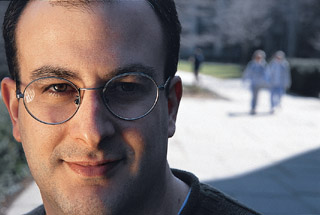Doctoral
Studies
>>
The mating game
The
birds do it, the bees do it-even the monkeys in the trees do it.
So why don't human beings do it? Ask James Roney. The "it"
in question involves courtship displays, and the Ph.D. candidate
in the Committee on Human Development observes that humans go
about it differently than our branch-swinging cousins.

Roney
theorizes that-unlike in many nonhuman vertebrates-sensory cues
from human females prompt a psychological reaction in males rather
than a physical one. Where in other vertebrates an aroused male
might exhibit motor and vocal displays, the human male undergoes
a subconscious change of behavior designed to attract the female.
In other words, instead of howling and beating his chest, he'll
flash the keys to his Lexus.
"Previous
studies have found that characteristics such as wealth, social
status, and ambition figure prominently in both female mate preferences
and male mate attraction tactics," says Roney, who began
his graduate work at Chicago in 1992. To test his belief that
exposure to women might prime the importance of these qualities
in men, Roney conducted a 1995 experiment that had Chicago high-school
students divided into same-sex and mixed-sex testing groups to
fill out attitude surveys. Although female responses were similar
in both groups, males in the mixed-sex groups placed much higher
values on both future wealth and dating success than did their
counterparts in the same-sex groups. These results suggest, says
Roney, "that the presence of females caused male evaluations
of wealth to become linked to dating success."
In
another experiment in 1997, Roney asked one group of male U of
C students to look at advertisements featuring "young, very
physically attractive women" and another group to look at
advertisements featuring women over 50. Both groups were told
they were taking part in an advertising study and were asked to
rate the ads for effectiveness before filling out surveys assessing
attitude, mood, and personality. As predicted, men in the first
group placed more value on financial success and reported stronger
feelings of aggression, ambition, and extroversion than did those
in the second group. "The men in these studies basically
adopted the psychological profile characteristic of high-status
men, at least in Western cultures," Roney says. "Furthermore,
this all appears to occur outside of conscious awareness."
A
question Roney is investigating now is whether the brain pathways
that mediate visual cues and psychological responses in humans
are the same that mediate courtship displays in nonhuman vertebrates.
"Mate attraction is a major topic in evolutionary psychology,
but there are some big unanswered questions," he says. "Research
has so far used survey methodology, but there hasn't really been
any work done on the cognitive processes involved, the actual
psychological mechanisms that are implemented in courtship and
mate attraction."
A
graduate of the University of Michigan, where he majored in Russian
studies, Roney had to start from scratch learning the biosciences
when he came to Chicago. Now he is finishing his degree and braving
the academic job market, hoping to continue his work on those
big unanswered questions.
-
C.S.

![]()
